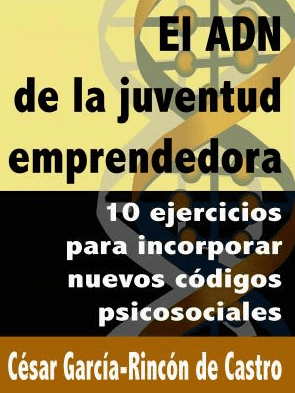
10 exercises to incorporate new psychosocial codes.
Cesar Garcia-Rincon de Castro (2013)
Science has made it possible for us to modify and repair DNA today. Advances in neuroscience make it increasingly feasible to modify attitudes and repair patterns of behavior that harm human beings.
Years ago the biological seemed unchangeable and the modifiable was the social. It is paradoxical that today the biological is relatively easy to modify and repair, and some patterns and social codes inherited generation after generation, today clearly dysfunctional, continue to survive strongly.
One of those patterns has to do with attitude towards work and personal development. In Spain, the comfortable zone continues to prevail when thinking about future work or profession: something fixed and stable, an opposition and to live that are two days.
But that attitude is not only not functional at the present time, in reality it never has been. Excessive comfort and relaxation causes more mental problems and take more people to the psychiatrist, Viktor Frankl tells us in "Man's Search for Meaning", that tension and stress.
Happiness is beyond the islands and paradises that sell us, it is in navigation, in adventure, on the road, in other places.
We need young sailors (exercise 1), who know how to configure their survival radar well (exercise 2), who attract and push others to undertake (exercise 3), who choose their attitudes well (exercise 4), who stop their time thieves (exercise 5), write the script of their own lives (exercise 6), do it in good company (exercise 7), communicate with their body (exercise 8), be leaders of service to others (exercise 9) and that strengthen social networks (exercise 10).
In each of the exercises I propose 3 steps:
• Step 1: It is called “exploring the map and the territory” and it is a walk through the most theoretical part of the exercise. Basically they are essential and necessary psychology concepts to function today, but explained in a way that is accessible to all.
• Step 2: Once we know what the subject is about, now it is time to explore within each one “what is this subject telling me”, that is, an inner exploration from the subject, looking for strengths and weaknesses.
• Step 3: When we have already done the internal and external exploration of the subject, it is time to draw a “road map” and set out, in order to practice and improve, to achieve concrete and tangible objectives on a day-to-day basis.
Definitely: experience - reflection - action It is the methodological triad that makes each exercise a powerful catalyst for change and personal improvement. Go ahead!
The 10 exercises that I propose in this book are the following:
Exercise 1. Escape from the comfort zone. Being a sailor in the face of challenges and challenges, overcoming the tourist or lookout attitude.
Exercise 2. Set up my survival radar. The basis of emotional intelligence is in our proactivity in the face of pleasant and unpleasant emotions.
Exercise 3. Improve my social magnetism. Forces of push and social attraction, expressive and receptive behaviors to achieve the objectives of all social interaction.
Exercise 4. Choose my own attitudes. The key is the information or cognitive aspect about the attitude object: if we let others tell us what to think, we are not free or autonomous.
Exercise 5. Catch my time thieves. Time management, quality time, is key, today more than ever in the face of multiple demands from multiple media.
Exercise 6. Be the scriptwriter of my life. Before being a spectator or actor of the scripts that others have written, being the author of my own life, innovating and carving out my own path.
Exercise 7. Live in good company. Knowing how to choose good friends and partners is essential, knowing the differences between plague friends and compost friends.
Exercise 8. Talk to my body. Non-verbal communication, what we express on the track of social meanings in each situation, learning to manage one's own expressiveness.
Exercise 9. Lead by helping others. Good leaders have always been in serving and helping others, prosocial leadership versus authoritarian leadership.
Exercise 10. Work in RED. Keys to working as a team and creating a good network of relationships that builds and adds value, the new spiderman era versus the old superman era.
The book is available on Kindle Amazon:
https://www.amazon.es/dp/B00CXACOMC